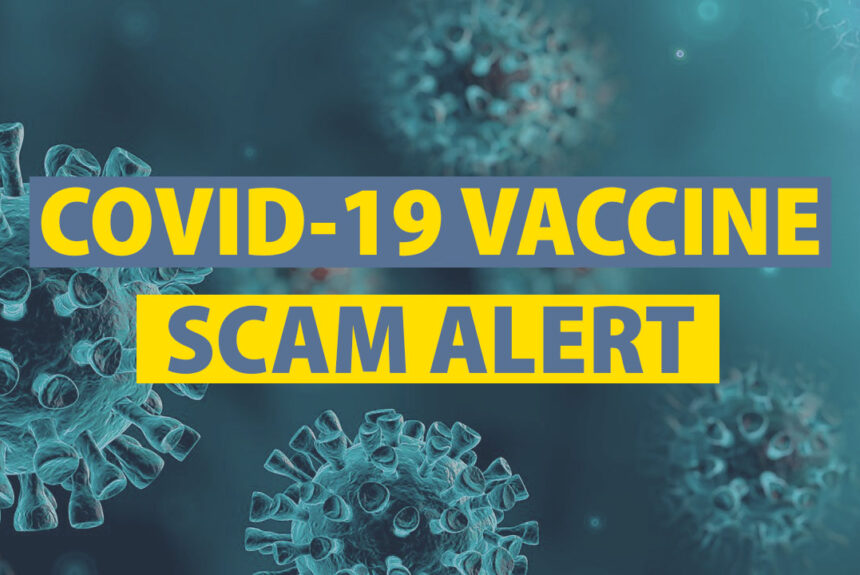Two COVID-19 vaccines became available in December (and a third followed shortly, becoming available in January). But with the vaccine rollout came many myths and fear, and now, scams.
Coronavirus scams are nothing new — the FBI halted hundreds of coronavirus scams in 2020, from fake cures to charity drives — but 2021 opened with a number of scams related to the vaccine directly.
The FBI released a warning letter to the public on Dec. 21, encouraging people to stay vigilant and beware of vaccine scams, like these eight that have been circulating.
Scam: Paying for priority access
The federal government has outlined the vaccine rollout schedule, and there’s no way to jump the line. You can’t pay to skip ahead of health care professionals, long-term care facility residents and workers, senior adults, educators, firefighters, police officers, agricultural workers, and other essential workers in priority groups.
Protect yourself: Ignore unsolicited emails, texts, and phone calls asking you to pay for priority access to a COVID-19 vaccine. Don’t click on online advertisements, event pages, or other web pages that promise priority access for a fee.
Scam: Scheduling appointments through Eventbrite and other platforms
While you may have to schedule an appointment for your COVID-19 vaccine when the time comes for you to get it, it won’t happen through Eventbrite or other event platforms. Scammers may steal your personal information when you submit it through signup forms.
Protect yourself: When it’s time for you to get the vaccine, call the health care facility you plan to go to. Make an appointment over the phone if needed.
Scam: Paying out-of-pocket for the vaccine
The COVID-19 vaccine is expected to be free to everyone in the US, whether or not you have health insurance. You shouldn’t pay for the vaccine, nor should you expect a surprise bill after the fact, because the federal government has written into law that the vaccine will pose no cost to Americans.
You might get a bill for a vaccine administration fee or other copays, but it’s unclear whether those fees are required to be paid in full by insurance companies or by reimbursement funds. If you request other medical services at the time of your vaccine appointment, you may be required to pay for those services or request reimbursement from your insurance.
Protect yourself: If you’re being asked to pay for the vaccine, especially ahead of time, don’t. If you get a bill in error, call your provider, explain the issue, and explore your reimbursement options.
Scam: Requiring a virus test or antibody test before getting the vaccine
You don’t need proof of a COVID-19 virus test or an antibody test to get the vaccine. However, scammers have made an opportunity out of this as well, and are contacting people via phone, text, and email requesting that people purchase and take a test. Advertisements of this nature are popping up online, too.
Protect yourself: There’s no requirement to take a COVID-19 test or antibody test before getting the COVID-19 vaccine, so ignore any phone calls, text messages, emails, or advertisements that tell you to do so.
Scam: Paying to put your name on a waiting list
While there is technically a waiting list for COVID-19 vaccine doses, you don’t have to pay to get on it — everyone already is, starting with high-risk and high-priority people. Dr. Anthony Fauci, director of the National Institute of Allergy and Infectious Diseases, expects the vaccine to become available to the general public around midsummer to early fall in 2021, Forbes reports, so if you’re not in a priority group as described in the vaccine rollout plan, don’t expect to get your vaccine before then unless public health officials say otherwise.
Protect yourself: Ignore requests to pay a fee to get on a COVID-19 vaccine waitlist and don’t provide personal or financial information to anyone asking you to do this. If you call a health care facility to register to get the vaccine, they may put you on a waitlist, but should not charge a fee.
Scam: Getting the dose shipped to you for a fee
The vaccine isn’t being shipped anywhere except to medical centers and pharmacies involved in the rollout. You cannot get the COVID-19 vaccine shipped to your home, and any advertisement that promises to do this is fake. Scammers may collect your personal or financial information this way.
Protect yourself: Knowing that you can’t receive a COVID-19 vaccine anywhere other than a pharmacy or medical facility, don’t attempt to get a vaccine shipped to your home.
Scam: Emails, text messages, and phone calls from fake vaccine centers and insurance companies
You may receive an unsolicited message or call from someone claiming to work for a vaccine center, pharmacy, or insurance company. These scammers might ask for personal and medical information to find out if you’re eligible to receive the vaccine — but everyone is eligible to receive the vaccine, just at different times.
Protect yourself: Ignore phone calls and text messages from unfamiliar numbers. Don’t open suspicious emails and definitely don’t click any links or provide personal information. Also, when it’s time for you to get the vaccine, only go to a reputable pharmacy or health care facility.
Scam: Online ads for vaccine doses from unofficial sources
Scammers are advertising COVID-19 vaccines as if a vaccine is any other product you can order online. Any advertisement that doesn’t come from an official public health source is likely attempting to lead you to a phishing website where scammers can steal your personal or financial information.
Protect yourself: Ignore any ads from unofficial sources. Official public health sources include the CDC, WHO, FDA, and other government agencies, as well as hospitals, pharmacies, and other medical centers.
Read the original article here.


